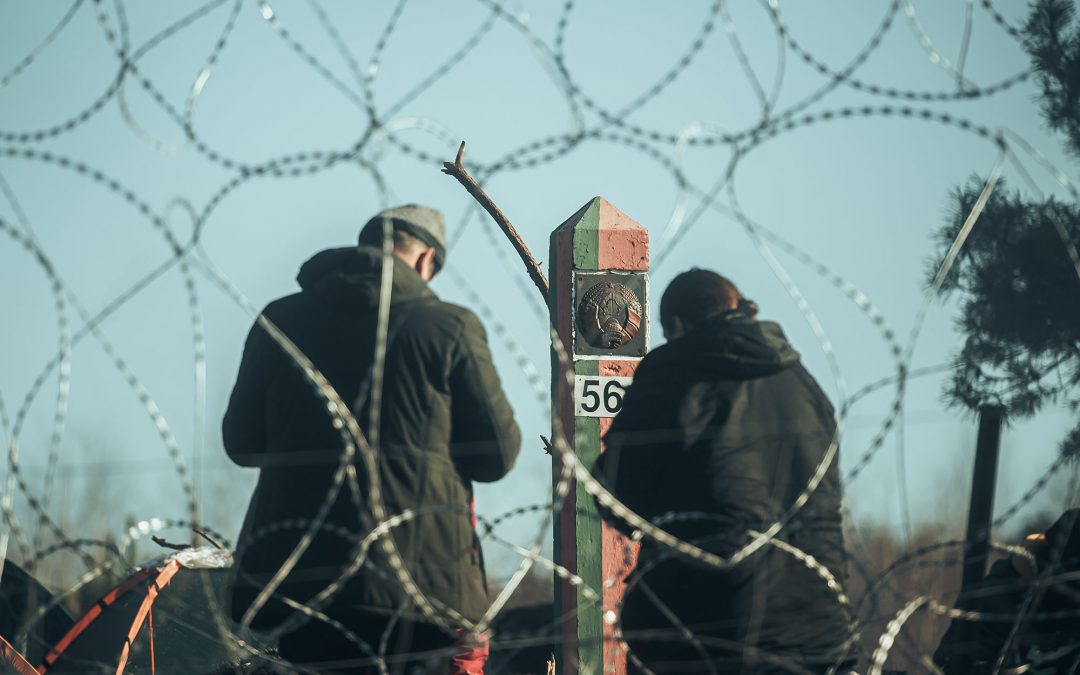There continues to be a “humanitarian crisis” on Poland’s border with Belarus – where tens of thousands of people, mainly from the Middle East, Asia and Africa, have been seeking to cross since last summer – reports the office of Poland’s commissioner for human rights (RPO).
It notes that Polish authorities continue to use the controversial practice of pushbacks – sending those who have crossed the border back into Belarus – something that the RPO’s office deems “incompatible with Polish law and international standards”.
Meanwhile, a group of Kurdish asylum seekers who crossed the border have been holding a hunger strike for over three weeks in protest against the conditions they are being held in at a Polish detention centre and at the lack of progress in processing their cases.
“Foreigners, including families with children, under the pressure of the Belarusian [security] services, are still attempting to cross the border in places not intended for that purposes,” wrote deputy human rights commissionn Hanna Machińska in the report. “The humanitarian crisis on the border continues, though on a smaller scale.”
Poland’s border guard reports that by 23 May it had recorded 5,143 attempts to illegally cross the border this year and 724 in May alone – an average of over 30 per day. That figures are, however, well below the peak last autumn, when 17,500 attempted crossings were recorded in October alone.
Earlier this week, footage emerged showing the brutal behaviour of Belarusian officers forcing migrants through barbed wire fencing on the border into Poland, despite screams of protests from the group.
Wstrząsające nagrania z granicy. Wiele zła widziałem, ale tu jest kumulacja.
Właśnie w ręce takich ludzi z BY @Straz_Graniczna wpycha cudzoziemców.
Na filmie widać, jak zbiry Łukaszenki traktują uchodźców, migrantów.
Do wideo dotarł Człowiek Lasu. Mówi, że to sprzed kilku dni. pic.twitter.com/bCxT6m7AoR— Piotr Czaban (@CzabanPiotr) May 25, 2022
A spokeswoman for the Polish border guard, Anna Michalska, later confirmed to Gazeta Wyborcza that the footage was recorded by its officers, who later provided the seven migrants – most likely from Cuba – with medical help.
“The foreigners were informed about the possibility to apply for international protection in Poland,” said Michalska, but added that they had declined to do so and were therefore informed that under the law they are obliged to leave Polish territory. Their further fate has not been reported.
Last year, Human Rights Watch accused Poland and Belarus of “shared responsibility for abuse” of migrants at their border. The NGO documented violence and other abuses by Belarusian officials, but also criticised Polish authorities for its policy of pushing back migrants into Belarus.
In her new report, Machińska notes that the policy of pushbacks is still in use, with dozens of cases this year, including some taking place at night. She reminds that the RPO’s office deems such procedures “incompatible with Polish law and international standards”.
In her previous reports, Machińska has also documented “unacceptable” conditions in detention centres for asylum seekers, which “do not fulfil the basic guarantees preventing inhuman and degrading treatment”. Those conditions have led to hunger protests and riots at some centres.
This month, the latest such protest has been taking place among Kurdish asylum seekers being held at a centre in Lesznowola. Their hunger strike has been ongoing for 24 days and now includes refuging to accept liquids, informed NGO Grupa Granica on Friday.
📣 Solidarnie ze strajkującymi. Dziś 24. dzień strajku głodowego w Lesznowoli. Od wczoraj wszyscy strajkujący przestali przyjmować płyny. W sprawie strajkujących interweniowali posłowie @HannaGillPiatek, @f_sterczewski, @AniskoTomasz i @ZalewskiPawel
Zdj. Wojciech Radwański/APP pic.twitter.com/iCrlMYmeJF— Grupa Granica (@GrupaGranica) May 27, 2022
A border guard spokeswoman, Dagmara Bielec, confirmed to Gazeta Wyborcza that 10 foreigners are participating in a protest against “lengthy administrative procedures” and “too much time in detention”.
“We are not criminals that need to be kept locked and in isolation,” they wrote in an open letter to the heads of the government’s Office for Foreigners and of the border guard. They claim that their human rights are being violated through the lack of progress in proceessing their cases and lack of access to translators.
“Employees of the centre are talking to the protesters about their administrative situation,” said Bielec, who assured that the conversations are conducted in English and with the support of Arabic and Kurdish interpreters.
According to a politician from the Greens (Zieloni), Laura Kwoczała, a similar hunger strike began this week at a holding centre in Przemyśl, with participants also complaining about a lack of progress in processing their cases.
❗️ Kolejny strajk głodowy – tym razem w Strzeżonym Ośrodku dla Cudzoziemców w Przemyślu!
Od dwóch dni protestują tam dwie osoby. Poinformowały o swojej woli tamtejszą Straż Graniczną. Protest wynika z opóźnionieniach w procedurach dot. ich wniosków oraz wielu miesięcy w detencji. pic.twitter.com/mg4gA7vECs— Laura Kwoczała 🌻 🇵🇱 🇺🇦 (@LauraKwoczala) May 27, 2022
The Polish authorities have defended their actions on the border, arguing that they comply with national and international legal requirements and are necessary to protect national security.
They point out that migrants and asylum seekers have been helped to reach Belarus and cross the border by the Belarusian authorities, and say that there is evidence that some pose a security threat.
Polling has shown that the majority of the Polish public support the government’s tough response to the crisis, which has included banning all non-residents – including journalists and NGOs – from the border area and building a wall on the border. Poland has also received backing from the EU and Germany.
Main image credit: Irek Dorozanski / DWOT (under CC BY-NC-ND 2.0)

Agnieszka Wądołowska is deputy editor-in-chief of Notes from Poland. She is a member of the European Press Prize’s preparatory committee. She was 2022 Fellow at the Entrepreneurial Journalism Creators Program at City University of New York. In 2024, she graduated from the Advanced Leadership Programme for Top Talents at the Center for Leadership. She has previously contributed to Gazeta Wyborcza, Wysokie Obcasy and Duży Format.




















